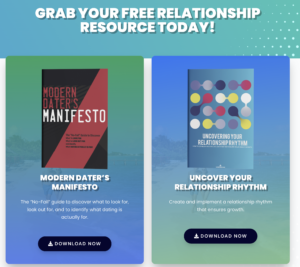DATING AFTER DIVORCE – Part 1: Are You Ready?
The majority of individuals who experience a divorce go on to remarry at some point in their lives and these second marriages statistically have higher divorce rates than first marriages. This tells me that something is missing in the preparation process between the ending of one marriage and the beginning of another. It seems that people are convinced they just “chose wrong” with the first spouse and choosing better the second time will surely solve the problems they faced in the previous marriage. Or they find a person who doesn’t possess the qualities that their prior spouse did which caused the majority of the relational conflict. This appears to be quite logical until one realizes that this person also has a whole new set of qualities that will also cause conflicts, just of a different variety. If you have experienced a divorce and find yourself contemplating a new relationship or possibly marriage again with your current relationship, let me give you some things to consider before walking down the aisle again.
The two big questions you have to answer before stepping into a serious relationship again are:
- Are You Ready?
- Are They Ready?
If the answer to both is yes, then chances of a successful remarriage increase dramatically. If the answer to one or both is no, then I would put the brakes on moving forward and take some time to evaluate yourself and the relationship. So let’s start with you. In an effort to assess your personal readiness we can look at Three Steps that are crucial for self-reflection.
ARE YOU READY?
STEP 1. DEAL WITH THE ANGER & GRIEF
Regardless of the circumstances that led to the ending of your marriage, the dissolving of the relationship resulted in some losses in your life. And anytime someone experiences a loss they will need to properly grieve that loss. In 1969 Swiss psychiatrist Elisabeth Kubler-Ross created the the Kubler-Ross model of grief that identified five stages of grieving. These five stages are: Denial, Anger, Bargaining, Depression and Acceptance.
If you are a person of faith then I would recommend evaluating the stages of grief that Pastor Rick Warren of Saddleback Church presents which are Shock, Sorrow, Struggle, Surrender, Sanctification and Service. Here is a link to understand those stages at greater length:
https://revwords.com/6-stages-of-grief-rick-and-kay-warren/
Divorce doesn’t sever the emotional attachment you had with your spouse, so you need to grieve the loss of that relationship. The best way to minimize the impact of past ghosts is to find ways to grieve properly and unhook yourself from the associated anger. Personally evaluate whether or not you have taken the time to grieve the loss and seek help from close friends or a professional counselor to work through the grieving process.
STEP 2. DIG UP THE PAST
I’m all for moving forward and not looking back, but it’s essential that you understand your own history. What hopes, dreams, and expectations did you have going into the last marriage? What part of its failure do you need to own? What could you have done differently? What red flags did you overlook as you entered that last relationship and why did you overlook them? What were you trying to get from your spouse that was missing in you, that another person isn’t able to provide? If you don’t have answers to these questions you will make the same mistakes again. The things you didn’t like in your old partner often live on in you if you don’t take time to revisit the past.
5 Red Flags to Never Ignore When Dating
Every person views life through a set of lenses and these lenses color everything that we see. That’s why two people can look at the same situation, hear the same message and experience the same thing but have different perspectives on what is happening. Part of digging up the past is taking the time to evaluate why you see, hear and experience things the way you do. Our lenses are influenced by our:
-Family of origin
-Past relationships
-God-given personalities
You need to understand these areas and how they have shaped you to properly understand why you act and react the way you do in different circumstances. For example; if you grew up in a home where your parents were very critical, expected perfection and believed that your best was never quite good enough then you will likely be more sensitive to feedback and criticism from your spouse. Your spouse may be offering gentle, truthful and kind critique of areas of your life that is meant to help you grow and become better because they love you….but all you may hear is criticism, rejection and abandonment which will cause you to respond with defensiveness or withdraw and isolate.
Before you run forward into a new relationship you must take some time to look back and dig up past experiences and relationships that may be feeding a false narrative and lies about your worth, identity and value. If you leave this area untouched it will surely show itself in your next marriage as well.
STEP 3. ASK YOURSELF THE HARD QUESTIONS
If we’re honest with ourselves, most of us get into relationships for selfish reasons. We want companionship, a family, financial stability, love, a best friend or whatever else you are seeking in your life. We are not getting married for the purely selfless motive of committing ourselves to life long service, sacrifice and submission to another. We like how this other person makes us feel about us, so we think a lifetime of this feeling sounds awfully good. Because we are masters of self-deception I believe we need to ask our selves the following difficult questions before running head first into a second marriage.
- Why are you pursuing a relationship?
What is the reason you want to be married again? Is it one of the reasons I just listed or maybe something else? Remember that whatever your motive or reason is for getting married, if that thing ceases to exist you will no longer want to be in the marriage because your reason for getting married is now absent. - Are you investing more than you can afford to lose?
I would encourage you to make a pros and cons list, or a list of things “I gain” and things “I lose” when looking at marriage again. What will the relationship give you that you don’t have? Things like companionship, additional money, a family, or sex. What will the relationship cost you? Things like money, time, energy, freedom, the ability to make decisions without consulting another person, etc. Be honest about what you will gain and what you will lose. - Are you content as a single person?
If you are not content as a single then you will not be content as a spouse. Don’t falsely assume that marriage will solve your loneliness issues, your financial issues, your sexual issues, your self-esteem issues. Marriage tends to magnify our issues rather than satisfy them. Make sure that you are content with who you are before getting into a marriage. Another person cannot provide security, significance, purpose or identity. Those are found only in God. - Are you more committed to your children or the marriage?
This is a question for those who will be bringing children into their second marriage. If you are not convinced that you can choose to put your spouse and marriage relationship before your children and role as parent then I would advise you not to remarry. A healthy family exists when a husband and wife have decided to prioritize the marriage relationship. Prioritizing children over the marriage will lay a faulty foundation for the relationship and lead to disunity.
As you can see these three steps to evaluate your readiness for remarriage are not a quick and easy process, and they shouldn’t be. Getting remarried is a big deal and a decision that should follow a lengthy time of healing and growth. I personally believe that a person should take a good year or two to focus on personal growth after ending a marriage before even thinking about dating again. It is too easy to run right back into a relationship convinced that the other person was the sole cause for the misery in your marriage. This is even more prevalent when the previous marriage was in decline for a long time and you may have already started to entertain a new relationship in your mind before the marriage was officially dissolved.
Taking proper time to grieve, dig up the past and ask yourself the hard questions will help you to grow personally and will increase the likelihood of success in your next relationship. Once you have taken the time to evaluate your personal readiness, step two is to evaluate the other person’s readiness. You may be ready now but how can you tell if the other person is ready? We’ll tackle that in part 2 of Dating After Divorce: Are They Ready?










